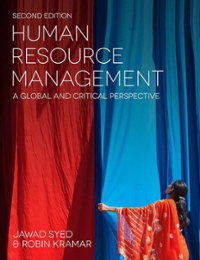Nandita Gurjar was Head of HR for 10 years at the Indian MNC Infosys, a global business
Question:
Nandita Gurjar was Head of HR for 10 years at the Indian MNC Infosys, a global business technology consulting services provider. She led the Infosys Role and Career Enhancement (i-Race) initiative to create high performance from October 2009. The changes took place in the context of India's IT sector post-recession shifting from recruiting masses of basic coders to a more volatile environment of customers requiring IT staff with high. levels of interpersonal and consultancy skills.
Gurjar explained the rationale for the i-Race programme: 'we have told employees that growth will be slower, promotions will be restricted, there will be lower salary hikes and fewer onsite assignments. Employees need to be aware that the days of a 50 per cent plus growth rate for the industry are over'.
Within the i-Race programme, employees could be promoted at any time of the year. The initiative attracted considerable criticism as some employees were adversely affected. It resulted in high staff attrition and employee dissatisfaction.
At the 2010 World HRD Congress (https://www.youtube.com/watch?v=yjQ_lcBlaE8), Gurjar commented: 'Somewhere the employee decided to believe that "because I spend nine to 10 hours of my working day in an organization, \(\mathrm{HR}\) is responsible for everything in my life"... We forget to mention that someone in the chain is called a client who allows you to bring the bread to the table. We are apologetic to talk about a client. There are lots of theories about the employee coming first [Nayar, 2010]. First where? I think it is HR's job first to bring the fundamentals back: you come here to create a career, we promise to create a career, we promise you investment and learning. Beyond that, you are as capable as you make yourself to be'.
In a surprise move in April 2013, Gurjar stepped down from her role, and she left Infosys a year later. Srikantan Moorthy (Tan) replaced her as Group Head of HRD with responsibility for several facets of the employee lifecycle including compensation and benefits, performance management, career development, and employee engagement. Tan subsequently moved to a non-HR role at infosys.
In March 2015 it was announced that Infosys would separate the role of Head of HR into two. One role concentrates on strategy, succession planning, and leadership development in line with the CEO's interest in artificial intelligence and new technology. The other role is responsible for HR operations and mass recruitment. In August 2015, Infosys appointed Krish Shankar as Executive Vice President (EVP) and Group Head of Human Resources from Philips, South Asia.
Questions
1 What were the external and internal contexts driving i-Race?
2 How do you think Gurjar could have formulated and implemented the programme differently?
3 Reflect on the evolution of the head of HR role at Infosys as the IT sector has matured.
4 What lessons can you draw personally about the political and personal aspects of working in HR in such a large firm?
5 Read the 2014 Knowledge@Wharton article on leadership at Infosys. Write your manifesto as a prospective Head of HR in the company: Will a Change in Leadership Turn Around Infosys? 19 June, http://knowledge. wharton.upenn.edu/articleficon-idle-leadership-challenges-facing-infosys/.
Step by Step Answer:

Human Resource Management A Global And Critical Perspective
ISBN: 9781137521620
2nd Edition
Authors: Jawad Syed, J; Kramar Syed, Robin Kramar




